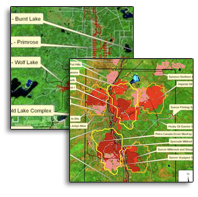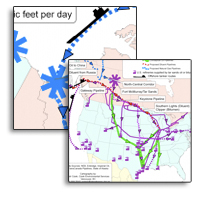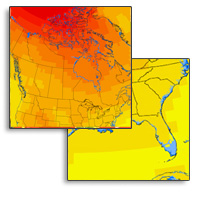Tar Sands 101
The Tar Sands "Gigaproject" is the largest industrial project in human history and likely also the most destructive. The tar sands mining procedure releases at least three times the CO2 emissions as regular oil production and is slated to become the single largest industrial contributor in North America to Climate Change.
The tar sands are already slated to be the cause of up to the second fastest rate of deforestation on the planet behind the Amazon Rainforest Basin. Currently approved projects will see 3 million barrels of tar sands mock crude produced daily by 2018; for each barrel of oil up to as high as five barrels of water are used.
Human health in many communities has seriously taken a turn for the worse with many causes alleged to be from tar sands production. Tar sands production has led to many serious social issues throughout Alberta, from housing crises to the vast expansion of temporary foreign worker programs that racialize and exploit so-called non-citizens. Infrastructure from pipelines to refineries to super tanker oil traffic on the seas crosses the continent in all directions to allthree major oceans and the Gulf of Mexico.
The mock oil produced primarily is consumed in the United States and helps to subsidize continued wars of aggression against other oil producing nations such as Iraq, Venezuela and Iran.
To understand the tar sands in more depth, continue to our Tar Sands 101 reading list
Petro-Canada Plans C$26.2 Billion 'Oil-Sands' Project
http://www.bloomberg.com/apps/news?pid=20601082&sid=ayjHX7wsn1WA&refer=c...
Petro-Canada Plans C$26.2 Billion Oil-Sands Project (Update7)
By Ian McKinnon
June 28 (Bloomberg) -- Petro-Canada, the third-largest oil company in Canada, and its partners will spend C$26.2 billion ($24.6 billion) on an oil-sands project in northern Alberta that's one of the world's most costly energy developments.
NDP and Environmentalists decrie tanker traffic- Gas Headed to Tar Sands
http://www.goldstreamgazette.com/portals-code/list.cgi?paper=12&cat=23&i...
NDP decries tanker traffic
Environmentalists and the NDP want the federal government to block passage of oil tankers, such as this one, along B.C.’s coast.
By Brennan Clarke
News staff
Jun 29 2007
Environmentalists allege federal Conservatives turning blind eye to moratorium
Increasing oil tanker activity in B.C.’s northern waters has West Coast NDPers calling on Ottawa and Victoria to “formalize” a long-standing moratorium on tanker traffic and offshore exploration.
“The (labour) picture [in Fort Muck] isn’t getting any better – in fact it’s getting worse."
Fort Hills to cost $14-billion
http://www.theglobeandmail.com/servlet/story/RTGAM.20070628.WBwenergyblo...
Norval Scott, June 28, 2007 at 10:45 AM EDT
The Peak Oil Crisis: Twin problems
The Peak Oil Crisis: Twin problems
Written by Tom Whipple
http://www.fcnp.com/index.php?option=com_content&task=view&id=1374&Itemi...
Thursday, 07 June 2007
Indigenous Nations Governments Challenging Tar Sands
Oilsands Facing Aboriginal Opposition
Copyright 2007 Nickle's Energy Group Copyright, a division of HCN
Publications Company
All Rights Reserved
Daily Oil Bulletin
A couple of First Nations groups are protesting oilsands operations
in their backyards.
The Woodland Cree First Nation (WCFN) says it intends to file an
intervention with the Alberta Energy and Utilities Board regarding
Shell Canada Limited's Carmon Creek oilsands project near Peace River.
Meanwhile the Clearwater River Dene Nation in northwest Saskatchewan
Call for Oil/Gas Traffic Ban on BC Coast
"The issue has gained prominence mainly because of several proposals
to construct pipelines linking Alberta with the coast at Prince
Rupert or Kitimat. Crude oil from the oil sands would be pumped west
for export, while "condensate" used to thin the thick crude in the
pipeline would be removed and sent back eastward along a parallel pipe."
The Globe and Mail (Canada)
June 25, 2007 Monday
http://www.theglobeandmail.com/servlet/story/LAC.20070625.BCTANKERS25/TP...
MPs call for Northern B.C. oil-tanker ban; Fear of spills could shut
Venezuelan Gusanos Flock to Fort McMurray
Fleeing Chavez, oil workers flock to frigid Alberta
By JOEL MILLMAN, The Wall Street Journal
Associated Press Financial Wire
June 26, 2007 Tuesday 2:10 PM GMT
FORT McMURRAY, Alberta Before he left Venezuela in April for this
petroleum outpost in northern Alberta, Freddy Mendez heard tales
about bone-chilling winter cold and lumbering moose. Since he's come
to town, he's seen two black bears in his neighborhood. Still, the
toughest adjustment is the late-night sun.
"You get a lot of work done when the sun doesn't set until 11," he
Panel: [Keystone] Pipeline may help stop jam
Panel: Pipeline may help stop jam
Janell Cole, Forum Communications Co.
http://www.in-forum.com/articles/index.cfm?id=170417§ion=News&forumc...
Published Saturday, June 30, 2007
BISMARCK – The North Dakota Industrial Commission is urging construction of the TransCanada Keystone Pipeline, saying it has the potential to alleviate an international pipeline bottleneck that hurts the sale of North Dakota crude oil.
Nuclear CO2 warming costs-- Helen Caldicott
http://www.upi.com/Security_Terrorism/Analysis/2007/05/21/ou...
Published: May 21, 2007 at 2:23 PM
Outside View: Nuclear CO2 warming costs
By HELEN CALDICOTT UPI
Outside View Commentator
MELBOURNE, May 21 (UPI) -- The fact is, it takes energy to make energy --
even nuclear energy. And the true "energetic costs" of making nuclear
energy -- the amounts of traditionally generated fuel it takes to create
"new" nuclear energy -- have not been tallied up until very recently.
What exactly is nuclear power? It is a very expensive, sophisticated and
Fort McMurray: Boomtown on a bender
Boomtown on a bender
Jun 28th 2007 | FORT MCMURRAY
From The Economist print edition
The downside of explosive growth in northern Alberta
WITH C$36 billion ($25 billion) invested so far in its oil sands and another C$45 billion expected over the next decade, the Canadian province of Alberta is booming. Workers have flocked in, lured by wages of up to C$120,000 a year. The once sleepy town of Fort McMurray, at the centre of the bonanza, boasts a crowded casino and a busy airport. But big money has brought big problems, including overstretched infrastructure and soaring drug use.



